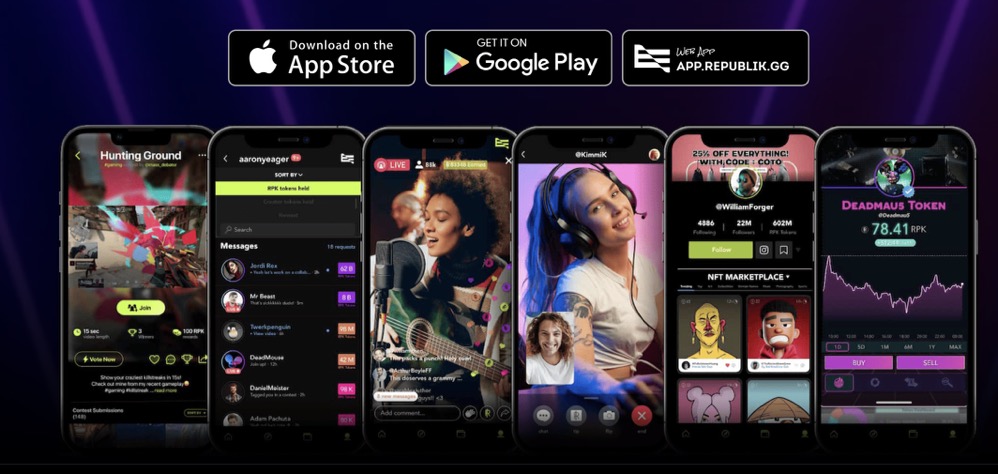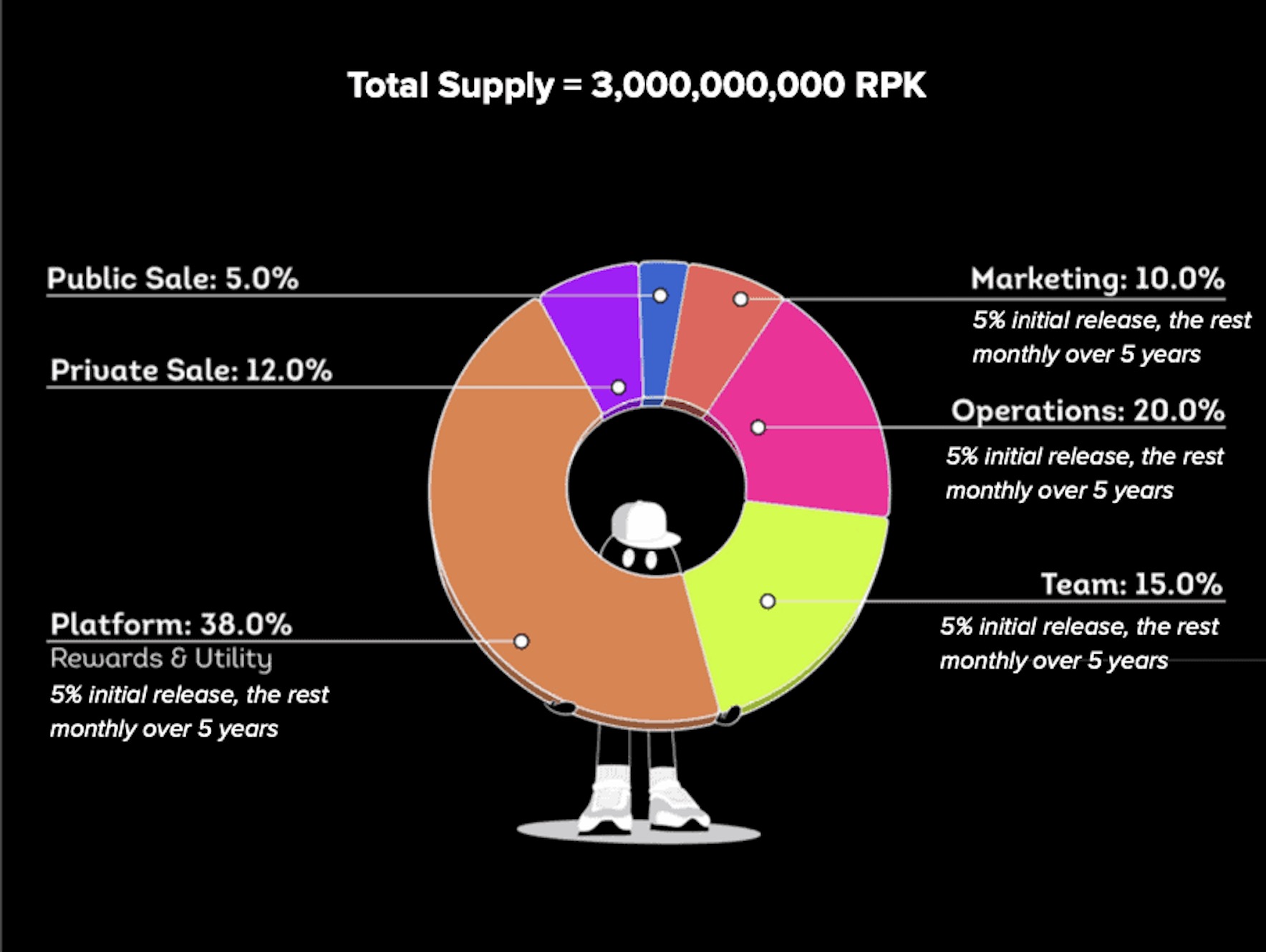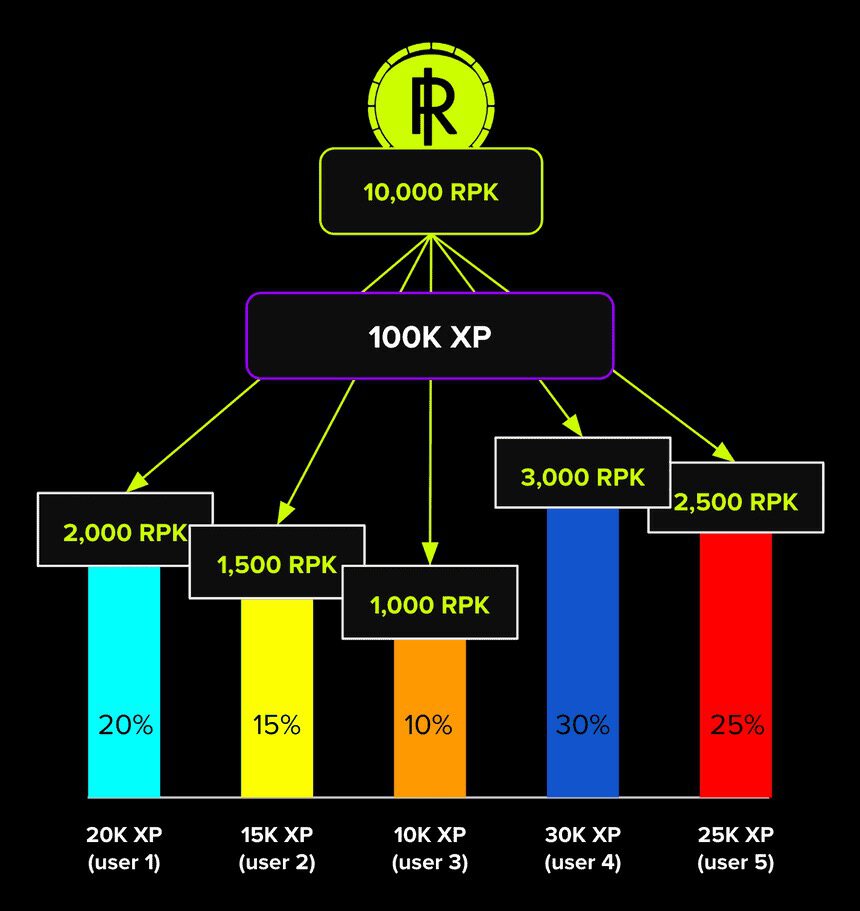Author: Nancy, PANews
Currently, the social app Friend.tech is popular, and X (formerly Twitter) has opened up ad revenue sharing, bringing the concept of creator economy back into the spotlight. The creator economy is considered a highly potential development direction, and leading social platforms and capital are all deploying strategies in the creator economy.
Recently, the Web3 content creation platform RepubliK announced a $6 million seed round financing, attracting much attention in the market. How could RepubliK attract significant investment during a bear market? What are the strategies for new and existing projects to compete?
Building an Upgraded Social Media Platform to Redistribute Creator Value
With the iteration of technology, enriched creation tools, and the introduction of incentive mechanisms, the creator economy ecosystem is accelerating its upgrade and transformation. According to the latest report from Goldman Sachs Research, the potential market size of the creator economy may double in the next five years, reaching $480 billion by 2027 from the current $250 billion. At the same time, the compound annual growth rate of 50 million creators worldwide in the next five years will reach 10% to 20%.
It can be said that it is the era where everyone is a creator, and creators are becoming a new economic entity. In fact, as early as 1996, Bill Gates across the ocean boldly predicted the importance of creators in the future of the internet in an article titled "Content is King." He wrote, "In a sense, the internet is a multimedia copy machine that allows content to be replicated at low cost, regardless of the size of the audience. To make the internet thrive, content providers must receive reasonable compensation for their work."
However, Bill Gates' vision was not realized in the Web1.0 era, where the static, one-way Web1.0 network made it difficult for users as content consumers to interact with the content. But as the internet entered the Web2.0 stage, users could create and share their own content, and the rise of social media also accelerated the exploration of monetizing self-expression by more and more creators, leading to the prosperous development of the creator economy. However, the problems caused by the oligopoly, such as uneven distribution of benefits, lack of control over personal data, and the absence of content management rights, have impacted the enthusiasm of creators. At the same time, the income of creators also plummeted due to adjustments in platform reward mechanisms, and the long-term "labor of love" has greatly reduced their content output.
In the decentralized context of Web3 technology, the rules of the game have changed, and the restructuring of production relations has given the creator economy a new look, providing greater space for ownership of content and monetization models. RepubliK is an all-in-one Web3 content platform aimed at redefining the relationship between creators, users, and value distribution, by serving as an ideal bridge for Web2 content creators to transition to Web3.
In other words, RepubliK is an upgraded version of a Web2 social media platform in terms of functionality. On the one hand, RepubliK has many functions found in traditional social media, including AI-driven home subscriptions, video streaming, chat and conversation, and social login, meeting the social needs of the vast majority of Web2 users. At the same time, unlike Web2 social apps that monopolize most of the revenue, RepubliK will redistribute community value based on user contributions, maximizing user income by significantly ceding platform revenue.

On the other hand, RepubliK has introduced various content monetization tools for creators using blockchain technology to maximize creator value and build a thriving community. For example, paid content allows content creators to restrict access to specific videos or photo posts; subscription services provide the audience of content creators with regular access to curated content streams in exchange for regular payments in RepubliK's platform token RPK; access permission unlocks allow content creators to provide exclusive content, interaction, or privileges to users who pay in RPK tokens; and chat permission unlocks monetize the chat permissions of content creators.
Moreover, RepubliK also allows creators to create their own tokens by paying a certain amount of RPK tokens, which can be understood as tokenizing personal reputation, allowing fans and supporters to purchase and hold these tokens to provide economic support to creators while betting on their future potential. Of course, for each creator token, RepubliK will also disclose multidimensional data such as income flow, creator ranking, number of fans, and number of works for investors and traders to make value judgments. Of course, RepubliK will evaluate whether creators qualify for issuance based on their historical income levels to ensure the value of the tokens and avoid Rug Pull events. In addition, according to the official website, creators can also create and sell NFTs and physical goods through RepubliK, providing more opportunities for fans and supporters to obtain collectible and unique items.
It is worth mentioning that as one of the main ways for interaction on RepubliK, the Conversation feature will become a trump card for creators and their audience. This feature mainly combines Web2 social media X (formerly Twitter) thread, Instagram Carousel album, and Add Yours, providing users with a better social experience. In addition, compared to traditional creator models, RepubliK's conversation feature has several highlights, including returning content control to the owner, creating community-driven sections that everyone can participate in, lowering the threshold for creator admission, and further activating brand creator activities to more accurately capture the real audience. In addition, RepubliK creates unique links for all content on the platform, and any user sharing links to audiences outside of RepubliK will be considered recommendations, greatly increasing the platform's influence on traditional Web2 social media.
In short, RepubliK will break the exploitative and harvesting creator economy relationship of centralized institutions like Web2 social platforms, helping creators to gain ownership freedom and allowing active contributors to more fairly share all economic profits of the platform, thereby contributing to the rapid development of the platform.
"RepubliK hopes to narrow the wealth gap in the digital world and create a fair competitive environment, fundamentally changing the way creators make a living with their passion. At the same time, the direct interaction and value exchange between creators and fans and supporters create deeper connections and loyalty, further expanding the influence of creators," said Daniel He, co-founder of RepubliK.
Securing Seed Round Financing in Over Half a Year, Airdrop and TGE Coming Soon
In the second half of the content competition, in addition to a more quality content ecosystem, more inclusive monetization models are also a common demand for creators. Compared to Web2 platforms, token incentive mechanisms are the core economic tools of Web3 content platforms, not only activating the creative enthusiasm of creators but also mobilizing the active participation of users.
RPK is the transaction and governance token of RepubliK, with a total supply of 3 billion, of which 5% is for public offering, 12% for private placement, 10% for market operations and expansion, 20% for operations and development, 38% for platform content creation rewards and XP reward airdrops, and the remaining 15% for team allocation.
RPK essentially represents the entire value of the RepubliK ecosystem. This is because, looking at the crypto market, the vast majority of projects hold the fees generated by the issuance of governance tokens, utility tokens, NFTs, etc. in their own hands. In contrast, the RPK token launched by RepubliK will represent community value, and all fees generated by the platform will be redistributed to the community, and users will receive continuous airdrops as a reward for ongoing contributions.

Specifically, in the RepubliK ecosystem, RPK can be used not only for purchasing works, tipping, etc., but also has voting rights to participate in platform governance. In addition, RPK is also a reward and incentive means for RepubliK to value user time and attention, and the amount of RPK allocated to users depends on the proportion of earned XP to the total accumulated XP of the entire platform. When each user joins RepubliK, the platform will distribute a certain amount of XP, and users can earn more through interaction, creating quality content, friend referrals, content sharing, etc. The more XP earned, the higher the user's honor badge level, providing additional privileges, exclusive events, and access to content, and increasing the multiplier for earning XP. Of course, if a user is inactive for a long time, the XP will gradually be deducted until the balance is zero.

RepubliK was launched in March 2023 and is currently being tested on web applications, iOS, and Android platforms. According to the upcoming roadmap, RepubliK will conduct a token airdrop, TGE (token generation event), and list on exchanges in the fourth quarter of this year.
The creator economy is attracting capital, and RepubliK is no exception.
In early October this year, RepubliK announced the successful completion of a $6 million seed round financing at a valuation of $75 million. The investment institutions include OKX Ventures, 6th Man Ventures, Arcane Ventures, CMS Holdings, Comma3 Ventures, Define Ventures, Enjin, FBG Capital, HTX Ventures, Mirana Ventures, Oracles Investment Group, Signum Capital, Sora Ventures, and UOB Venture Management. In addition to its own model and track being well-regarded, team strength is also an indispensable factor. Chief Advisor Richmond Teo is the co-founder of Paxos, co-founder and former CFO Daniel He has served as the former economic advisor of Enjin, former management consultant at Monitor Group Asia, and has extensive experience in finance, pharmaceuticals, and manufacturing. Market Director Andrew Lee has worked at Sequoia Capital, Google, and others. At the same time, RepubliK's advisory team has a strong background, including Ube's Technical Manager Tim Zhu, Grammy Award-winning producer QD3, Venture Capital investor Jonathan Teo, and Marek Dawidowicz, YouTube's APAC Marketing Director. "Today's users are no longer satisfied with passive consumption. They seek interactive and meaningful participation, and blockchain technology and decentralized governance models can give users greater control over their data and interactions, and promote active participation in platform shaping, thereby creating a sustainable and resilient social media ecosystem." As Richmond Teo said, the flourishing development of Web3 creator economy is a profound manifestation of technological and cognitive progress. "People-oriented" is becoming the core of content competition and the growth flywheel of building one's own business. Perhaps in Web3 content platforms like RepubliK, creators will find it easier to find "poetry and the distant."免责声明:本文章仅代表作者个人观点,不代表本平台的立场和观点。本文章仅供信息分享,不构成对任何人的任何投资建议。用户与作者之间的任何争议,与本平台无关。如网页中刊载的文章或图片涉及侵权,请提供相关的权利证明和身份证明发送邮件到support@aicoin.com,本平台相关工作人员将会进行核查。




